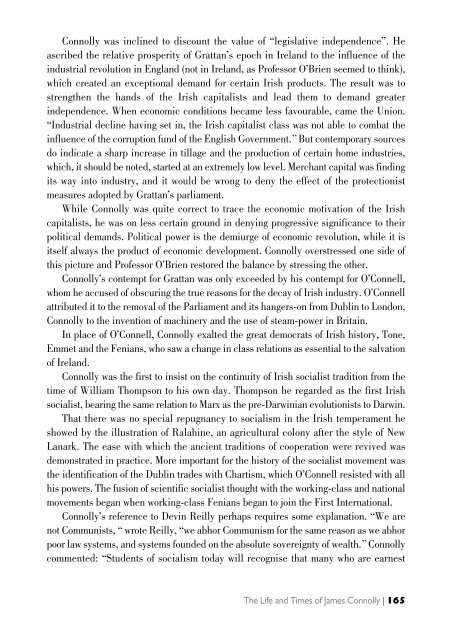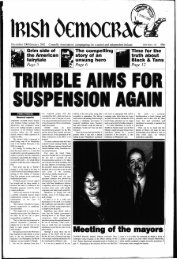You also want an ePaper? Increase the reach of your titles
YUMPU automatically turns print PDFs into web optimized ePapers that Google loves.
<strong>Connolly</strong> was inclined to discount the value <strong>of</strong> “legislative independence”. He<br />
ascribed the relative prosperity <strong>of</strong> Grattan’s epoch in Irel<strong>and</strong> to the influence <strong>of</strong> the<br />
industrial revolution in Engl<strong>and</strong> (not in Irel<strong>and</strong>, as Pr<strong>of</strong>essor O’Brien seemed to think),<br />
which created an exceptional dem<strong>and</strong> for certain Irish products. <strong>The</strong> result was to<br />
strengthen the h<strong>and</strong>s <strong>of</strong> the Irish capitalists <strong>and</strong> lead them to dem<strong>and</strong> greater<br />
independence. When economic conditions became less favourable, came the Union.<br />
“Industrial decline having set in, the Irish capitalist class was not able to combat the<br />
influence <strong>of</strong> the corruption fund <strong>of</strong> the English Government.” But contemporary sources<br />
do indicate a sharp increase in tillage <strong>and</strong> the production <strong>of</strong> certain home industries,<br />
which, it should be noted, started at an extremely low level. Merchant capital was finding<br />
its way into industry, <strong>and</strong> it would be wrong to deny the effect <strong>of</strong> the protectionist<br />
measures adopted by Grattan’s parliament.<br />
While <strong>Connolly</strong> was quite correct to trace the economic motivation <strong>of</strong> the Irish<br />
capitalists, he was on less certain ground in denying progressive significance to their<br />
political dem<strong>and</strong>s. Political power is the demiurge <strong>of</strong> economic revolution, while it is<br />
itself always the product <strong>of</strong> economic development. <strong>Connolly</strong> overstressed one side <strong>of</strong><br />
this picture <strong>and</strong> Pr<strong>of</strong>essor O’Brien restored the balance by stressing the other.<br />
<strong>Connolly</strong>’s contempt for Grattan was only exceeded by his contempt for O’Connell,<br />
whom he accused <strong>of</strong> obscuring the true reasons for the decay <strong>of</strong> Irish industry. O’Connell<br />
attributed it to the removal <strong>of</strong> the Parliament <strong>and</strong> its hangers-on from Dublin to London,<br />
<strong>Connolly</strong> to the invention <strong>of</strong> machinery <strong>and</strong> the use <strong>of</strong> steam-power in Britain.<br />
In place <strong>of</strong> O’Connell, <strong>Connolly</strong> exalted the great democrats <strong>of</strong> Irish history, Tone,<br />
Emmet <strong>and</strong> the Fenians, who saw a change in class relations as essential to the salvation<br />
<strong>of</strong> Irel<strong>and</strong>.<br />
<strong>Connolly</strong> was the first to insist on the continuity <strong>of</strong> Irish socialist tradition from the<br />
time <strong>of</strong> William Thompson to his own day. Thompson he regarded as the first Irish<br />
socialist, bearing the same relation to Marx as the pre-Darwinian evolutionists to Darwin.<br />
That there was no special repugnancy to socialism in the Irish temperament he<br />
showed by the illustration <strong>of</strong> Ralahine, an agricultural colony after the style <strong>of</strong> New<br />
Lanark. <strong>The</strong> ease with which the ancient traditions <strong>of</strong> cooperation were revived was<br />
demonstrated in practice. More important for the history <strong>of</strong> the socialist movement was<br />
the identification <strong>of</strong> the Dublin trades with Chartism, which O’Connell resisted with all<br />
his powers. <strong>The</strong> fusion <strong>of</strong> scientific socialist thought with the working-class <strong>and</strong> national<br />
movements began when working-class Fenians began to join the First International.<br />
<strong>Connolly</strong>’s reference to Devin Reilly perhaps requires some explanation. “We are<br />
not Communists, “ wrote Reilly, “we abhor Communism for the same reason as we abhor<br />
poor law systems, <strong>and</strong> systems founded on the absolute sovereignty <strong>of</strong> wealth.” <strong>Connolly</strong><br />
commented: “Students <strong>of</strong> socialism today will recognise that many who are earnest<br />
<strong>The</strong> <strong>Life</strong> <strong>and</strong> <strong>Times</strong> <strong>of</strong> <strong>James</strong> <strong>Connolly</strong> | 165

















